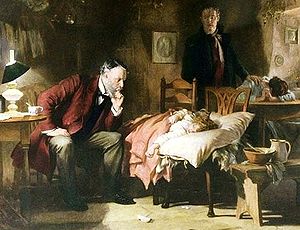20th April 2013
By Sayer Ji
Contributing writer for Wake Up World
A surprisingly consistent body of research exists indicating that conventional medical training actually reduces practitioner empathy. What is worse, the decline in empathy appears even more pronounced at the time that the curriculum shifts towards patient-care activities.
In one study published in 2009 in the journal Academic Medicine entitled “The devil is in the third year: a longitudinal study of erosion of empathy in medical school,” the authors conclude:
It is ironic that the erosion of empathy occurs during a time when the curriculum is shifting toward patient-care activities; this is when empathy is most essential.”
In another, higher-powered systematic review published in the same journal last year entitled “Empathy decline and its reasons: a systematic review of studies with medical students and residents,” researchers looked at data from 1990-2010, which included 18 studies, and found:
“The five longitudinal and two cross-sectional studies of residents showed a decrease in empathy during residency. The studies pointed to the clinical practice phase of training and the distress produced by aspects of the “hidden,” “formal,” and “informal” curricula as main reasons for empathy decline.”
They Concluded
The results of the reviewed studies, especially those with longitudinal data, suggest that empathy decline during medical school and residency compromises striving toward professionalism and may threaten health care quality.”
While the ironic decline of empathy associated with clinical practice during medical training is cause for concern, what may be even more disturbing is that the decline in empathy persists after training has ended.
In a 2005 study published in Academic Medicine and entitled “Mood change and empathy decline persist during three years of internal medicine training,” researchers noted that some of the mood disturbances and declines in empathy associated with residency/internship “never fully recover,” indicating that conventional medical training may produce real, diagnosable psychological traumas that may never be fully resolved and may adversely affect the quality of healthcare provided.
Empathy, after all, has concrete and measurable therapeutic effects in others. In 2009, researchers found that practitioner empathy reduced the duration of the common cold in their patients. Conversely, a negative and/or indifferent attitude towards the patient has measurable adverse effects, also known as the nocebo effect. Indeed, our recent article titled, “Research: Some Cancer Diagnoses Kill You Quicker Than the Cancer,” discusses the finding that the risk of suicide is up to 16 times higher and the risk of heart-related death 26.9 times higher during the first week following a cancer diagnosis versus those who were diagnosed cancer free.
Recent articles by Sayer Ji
- The Evidence-Based Healing Properties of 13 Common Fruits
- Dental Composites for Kids: Even Worse Than Mercury Amalgam?
- 13 Evidence-Based Medicinal Properties of Coconut Oil
- Five Amazing Healing Honey Facts
- Is This Fruit Extract 10,000 Times Better Than Chemotherapy?
Sayer Ji is the founder and director of GreenMedInfo.com and an advisory board member at the National Health Federation, an international nonprofit, consumer-education, health-freedom organization. He co-authored the book Cancer Killers: The Cause Is The Cure, and is working on another one with Tania Melkonian titled EATomology: An Edible Philosophy of Food.

If you've ever found value in our articles, we'd greatly appreciate your support by purchasing Mindful Meditation Techniques for Kids - A Practical Guide for Adults to Empower Kids with the Gift of Inner Peace and Resilience for Life.
In the spirit of mindfulness, we encourage you to choose the paperback version. Delve into its pages away from screen glare and notifications, allowing yourself to fully immerse in the transformative practices within. The physical book enriches the learning process and serves as a tangible commitment to mindfulness, easily shared among family and friends.
Over the past few years, Wake Up World has faced significant online censorship, impacting our financial ability to stay online. Instead of soliciting donations, we're exploring win-win solutions with our readers to remain financially viable. Moving into book publishing, we hope to secure ongoing funds to continue our mission. With over 8,500 articles published in the past 13 years, we are committed to keeping our content free and accessible to everyone, without resorting to a paywall.








